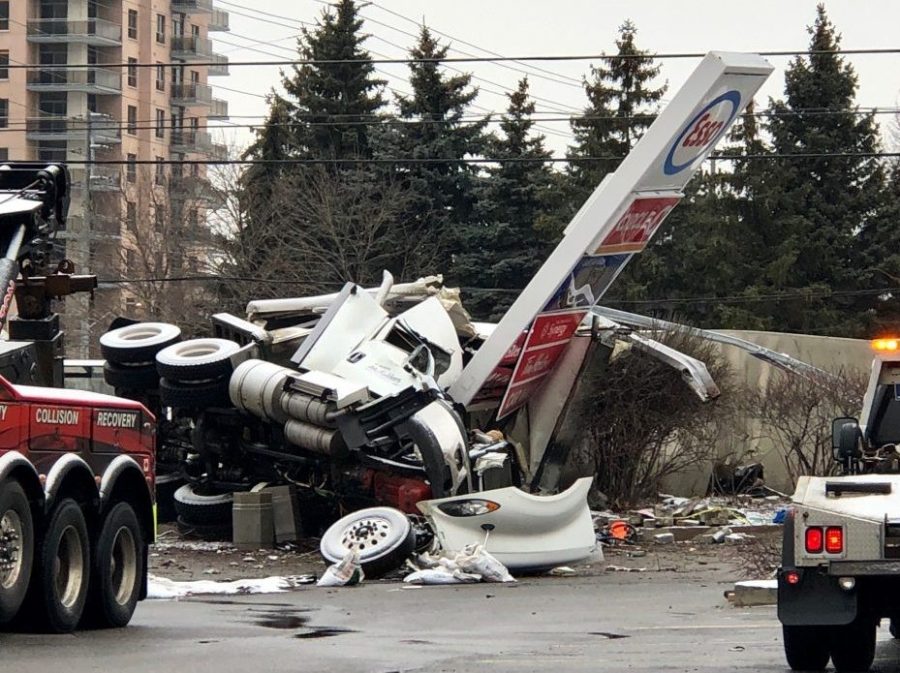
A tractor trailer on its side against an Esso sign at Eglinton and Mavis after a deadly crash on Jan. 13, 2020. (Ernest Doroszuk/Toronto Sun)
When did you ever think that the Peel Region would come second only to California in anything? In one category it does and that’s cargo theft. According to Marco Beghetto of the Ontario Trucking Association, “The Peel Region comes second only to California as the highest jurisdiction for cargo crime”, which costs the Canadian economy $ 5 billion per year according to the Insurance Bureau of Canada (IBC). Although cargo theft in the U.S. has declined in recent years, the opposite trend is happening in Canada with triple the number of loads being stolen in 2019 as compared with 213 loads in 2015. The average loss by load is $ 200,000.
These thefts cost the regional economy millions of dollars annually and contribute to funding other violet crime in Brampton and Mississauga. Beghetto from the OTA says, “Often what happens is cargo crime is used to support and fund far more nefarious criminal activity so they have a very sophisticated network of buyers ready to go.” Cargo crime often provides the seed money needed for other criminal endeavours such as running drugs or funding terrorist activities.
Low Risk/High Reward Crime
As we approach the first holiday long weekend of 2020, it’s a good time to think about your plan to protect your loads. Especially as the Peel Region is one of the busiest distribution hubs in North America, making a target-rich environment for cargo crime. The area also offers the advantageous benefit of being conveniently located to major highways, which make for an efficient way to get out of town, dismantle loads and sell them off. The teams of offenders are highly-organized often using their own specialized equipment such as refrigerated trailers or warehouses to offload cargo.
It’s a lucrative crime because the thieves have established connections with buyers who are seeking high-value goods that are easily trafficked. Meat along with food and beverages are high-value loads that can be disposed of quickly and are difficult to trace. Thieves won’t take anything perishable unless they already have a buyer in place. Boxed meat was the cargo in the stolen truck that crashed into the Esso gas station sign at the corner of Mavis Road and Eglington Avenue West in the early morning hours of Monday, January 13, 2020.
Thieves in the U.S. and Canada frequently steal unattended cargo trucks parked at unsecure locations, including truck stops and gas stations. The owner of the semi-truck involved in the incident mentioned above said his vehicle was stolen a week before it was involved in the cargo crime. Police suspect that “insiders” are paid to tip off truckload thieves looking for high-value goods, which are repackaged and sold off in stores or at flea markets, or shipped out of province for sale.
Digital Business Models Are Creating Opportunities
As the transportation industry adopts digital platforms and tools, more cargo thefts are being traced to system breaches. For a savvy criminal, an online broker site with poor security measures such as weak passwords can reveal a lot of information about carriers and scheduled load deliveries.
In many cases, thieves visit online load broker websites to identify a scheduled load, create fake documents that allow them to assume a false identity and pick up the load early by masquerading as representatives from the intended company. Then by the time the real carrier goes to pick up the load, the criminals have already made off with the goods.
Since cyber-security is the responsibility of every load broker as there is no regulatory body, it’s a pragmatic decision to make sure that your data access is as secure as the loads you manage. It’s incumbent on every company to understand all their transportation risks and have a comprehensive plan in place to protect their shipments.
Protecting Your Truckloads
If you must retain loads over a long weekend, do so at a secure, continuously monitored terminals with fencing and controlled access points. Limit the amount of time that loaded trailers are left unattended. Preventative measures include closed-circuit cameras, security lighting, roving security patrols and locked key boxes inside office.
One of the best deterrents for cargo theft is to install GPS on your trailers. The reason they’re so frequently stolen is that there’s usually no way to trace the equipment once it’s left the yard. Another best practice for protecting your equipment and loads is to operate on a least privilege principle where information and access are limited to a need-to-know basis. Everyone should keep their mouths shut when it comes to high-value loads. Truck stop talk can be an easy way to find out about loads and their destination.
Lastly, when using third-party brokers perform due diligence and check out their online reviews. Verify their identity by undertaking complete background checks and researching the integrity of any sub-brokered carriers. Cargo theft is a crime of opportunity, the more barriers you can put in place, the less likely that would-be thieves will target your load.
Tags: Preventative Maintenance, Protecting Assets, Total Cost of Ownership, truck and trailer repair
